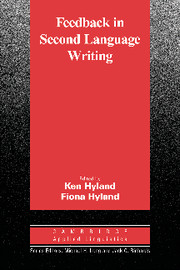Book contents
- Frontmatter
- Contents
- Contributors
- Series editors' preface
- Preface
- Chapter 1 Contexts and issues in feedback on L2 writing: An introduction
- I SITUATING FEEDBACK: SOCIOCULTURAL DIMENSIONS
- II SHAPING FEEDBACK: DELIVERY AND FOCUS DIMENSIONS
- III NEGOTIATING FEEDBACK: INTERPERSONAL AND INTERACTIONAL DIMENSIONS
- Author index
- Subject index
Chapter 1 - Contexts and issues in feedback on L2 writing: An introduction
Published online by Cambridge University Press: 05 October 2012
- Frontmatter
- Contents
- Contributors
- Series editors' preface
- Preface
- Chapter 1 Contexts and issues in feedback on L2 writing: An introduction
- I SITUATING FEEDBACK: SOCIOCULTURAL DIMENSIONS
- II SHAPING FEEDBACK: DELIVERY AND FOCUS DIMENSIONS
- III NEGOTIATING FEEDBACK: INTERPERSONAL AND INTERACTIONAL DIMENSIONS
- Author index
- Subject index
Summary
Feedback is widely seen in education as crucial for both encouraging and consolidating learning (Anderson, 1982; Brophy, 1981; Vygotsky, 1978), and this significance has also been recognized by those working in the field of second language writing. Its importance is acknowledged in processbased classrooms, where it forms a key element of the students' growing control over composing skills, and by genre-oriented teachers employing scaffolded learning techniques. In fact, over the past 20 years, changes in writing pedagogy and research have transformed feedback practices, with teacher comments often supplemented with peer feedback, writing workshops, conferences, and computer-delivered feedback. Summative feedback, designed to evaluate writing as a product, has generally been replaced by formative feedback that points forward to the student's future writing and the development of his or her writing processes. More widely, there is a growing awareness of the social and political implications of teacher and peer response.
Although feedback is a central aspect of ESL writing programs across the world, the research literature has not been unequivocally positive about its role in instruction, and teachers often have a sense that they are not making use of its full potential. This book addresses this incongruity, and in this introductory chapter we offer an overview of some key issues and preview the book's organization.
Some historical context
The importance of feedback emerged with the development of learnercentered approaches to writing instruction in North American L1 composition classes during the 1970s.
- Type
- Chapter
- Information
- Feedback in Second Language WritingContexts and Issues, pp. 1 - 20Publisher: Cambridge University PressPrint publication year: 2006
- 19
- Cited by



